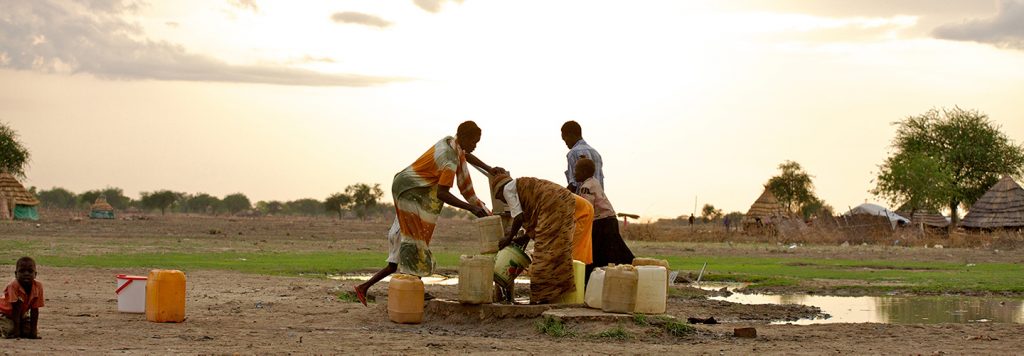After nearly 20 years of helping others, this IOM interpreter finally finds refuge in America.
|
Getting your Trinity Audio player ready...
|
Hassan remembers the tourists, a brief, vibrant intrusion into his childhood in Sudan. They wandered around the market, peering at the wares and interviewing the locals. They even took a picture with Hassan’s mother, all the while babbling in a strange language. The shopkeeper’s simple explanation: “Those are from very far place. Those are from U.S.”
Taken with the strange people, Hassan thought to himself, “I have to see the place called U.S.”
But what was the language that the people spoke? English? Hassan would learn English. At school it was required for the students to learn basic English, but most didn’t retain it past the brief lessons. Hassan thew himself into each word, asking for private lessons, driven by a desire he couldn’t yet articulate. A desire that would shape his future as an IOM interpreter.

He was one of the few survivors when his village was massacred
The attack on his village was a calculated horror. The attackers knew the village, knew its weakness: the dry, grass-thatched roofs could turn a house into a fiery pyre instantaneously. They started by burning the houses. Hassan remembered seeing the flames shoot into the sky. The villagers ran, their desperate flight a tragic mistake. The attackers shot the escapees and forced several back into the fiery homes.
Miraculously, Hassan survived the village attack, escaping to Al Geneina. For nearly two decades, he lived in a state of precarious limbo, building houses to pay his way to Kenya. It was in a Kenyan refugee camp that he met his wife and started his family. Despite the challenging circumstances, Hassan’s determination to learn English never wavered.
During this time, he diligently learned English, adding it to his already impressive linguistic repertoire: Sudanese, Masalit, Swahili, and Arabic.
Even as a Sudanese refugee, Hassan never gave up on his dream of helping others
Hassan was convinced that he didn’t pass the interview – he had applied to be an interpreter for U.S. Citizenship and Immigration Services (USCIS). For refugees facing the intense scrutiny of the vetting process, this role was a lifeline, a bridge across language and understanding. The call, when it came, was a shock, a wave of relief washing over him. He’d been chosen to be an interpreter!
Hassan spent years as a USCIS and IOM interpreter, a vital role in conveying the often-heartbreaking narratives of Sudanese refugee families. He told their accounts of fleeing danger, ensuring no detail was lost in each word. Afterwards Hassan would sign a confidentiality agreement: everything that was communicated was interpreted exactly as said.

But the gratefulness of the families followed him out. After the interviews Hassan would often hear words like “thank you for your services.”
“I tell them, that is my job. I have to do that… I’m there for you to make you understand exactly what [the IOM interviewer] says and able to tell your story. That is my job.”
“I feel very happy,” Hassan said, “because I did something to make two people understand each other.”
Then, in November 2024, Hassan learned he would be resettling in the U.S., and his long-held dream began to materialize.
Being a faithful steward of his gifts, Hassan continues to bless the community in Spokane
“English in the U.S. is different,” Hassan observed, recognizing the subtle yet significant variations from American, British and Sudanese English. Never one to shy away from a linguistic challenge, he immediately enrolled in American English classes at Spokane Community College. “I have more to learn.”
“He’s going to be so good,” said Garrit, Hassan’s case manager. He has seen Hassan move quickly towards self-sufficiency and is confident that Hassan will do well in the Spokane community. “He won’t need any help soon.”
With characteristic efficiency, Hassan enrolled his children in school and commenced his job search. However, his desire to serve as an interpreter and translator remained paramount. He observed the communication difficulties faced by Sudanese refugees. Leveraging his experience as an IOM interpreter, he offered his assistance as an interpreter. He helped refugees navigate interactions with case managers, participated in workshops, and shared practical advice for English language learners:
“Really, if you need to learn well – start at the beginning, you know, about the alphabet well and also from there about certain more vocabulary.” Hassan emphasizes the power of listening to others and picking up the language that way.
“I do encourage everyone who comes to the United States to go to the English classes, first to learn how to communicate,” said Hassan. “In America people do different English as I have seen in Kenya and Africa, and also different if you compare British speakers. There’s a big difference… to know about the accent of the American.”
“Each of you should use whatever gift you have received to serve others, as faithful stewards of God’s grace in its various forms. Do not be slothful in zeal, be fervent in spirit, serve the Lord.”
1 Peter 4:10-11
Hassan’s story reminds us that 1 Peter 4:10-11 isn’t just words on a page, but a call to action. Right here, in Spokane, refugees are looking for a place to belong, to contribute. They are looking for a community. Will you open your heart and your community, inviting them to share their gifts, enriching our lives as we enrich theirs? Will you use your gifts to welcome them into the community?

About the Author
Keri Bambock is the Communications Coordinator at World Relief Spokane. Her hobbies include sketching and painting. She likes riding her bike to the office and always gets the best parking spot.

